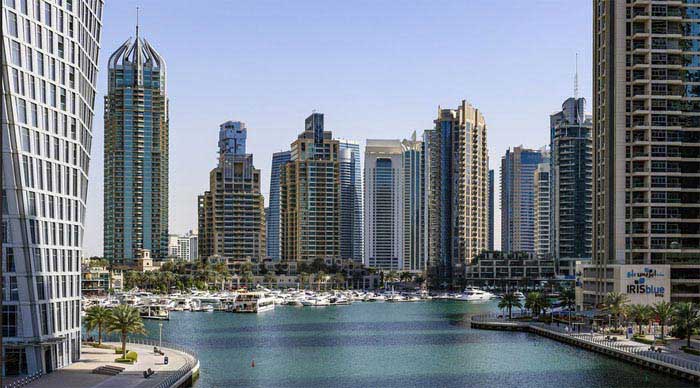Initially, Dubai's economy was built on the revenues it received from the oil and natural gas industries, although currently this surprisingly accounts for less than 20% of it's economic activity. As time goes by and more people are attracted to this metropolis in the desert, the tourism industry is beginning to take over, and as more people move to the area and there is a higher demand for housing, hotels and the general growth of the city, the construction industry has had the largest growth due to projects like the Burj Khalifa complex and the Dubai Marina. It is one of the fastest growing cities in the Middle East.
The US and UAE economic relation is one of the fastest growing in the world. The UAE is the United States' largest export market in the Middle East, and more than 1000 US firms have a presence in the UAE. 1.6% of all US exports were to the UAE in 2013. The city is important for US business as made apparent in a steady upwards rise in FDI from US direct investment in United Arab Emirates stock.
Saudi Arabia has almost a fifth of the world's oil supplies, and has therefore become the biggest exporter of oil and petroleum which is how the city became so rich. An estimated 240,000 barrels of oil are produced in Dubai on a daily basis. With oil extraction taking place at such a quick rate, it is predicted that the supplies will be exhausted by 2030, and that so we are already seeing a slump in oil production and export from the area. 11% of gross petroleum imports to the US come from the UAE.
Because of this, to maintain it's high living standards and wealth and to conserve the flow of foreign exchange, Dubai has had to rely on different industry sectors. Dubai was the world's eighth most visited city in 2007 and this figure continues to rise with the expansion of the Emirates Airline and extensions in the Dubai International Airport. The airport is situated on many long distance routes making it a popular place for a layover or even for a short break to the city. Major attractions for tourists in the city include visits to the desert, shopping festivals, amazing pieces of architecture and construction (both ancient and modern) and beautiful coastline.
Real-estate and property are also on the rise. Dubai has become a very desirable location to live and so we have seen a rise in demand for housing. Naturally, there has also been an increase in construction to create these buildings. The global recession in 2008 set back the real-estate market in Dubai considerably, but it seems to have recovered and be on the increase again with properties gaining value and more skyscrapers are being constructed. Over 50,000 US nationals reside in the UAE.
Dubai houses the world's third largest gold and diamond trading markets. The city accounts for around 25% of our global trade of gold, which draws in wealthy shoppers from all over the world. It is such an important industry to the city that it has been labelled “The City of Gold”. The free trade environment in Dubai makes it the cheapest place in the world to buy gold.
There is also a large market for fast food in Dubai, with over 5000 fast food restaurants and chains situated in the city. Most residents of the city will drink bottled water instead of tap water, so the demand for this is very high and it has become a very large industry.
Retail is a notable industry with over 70 shopping malls in the city. It is particularly renowned for the Souk districts where people travel from all over the world to spend their money.

